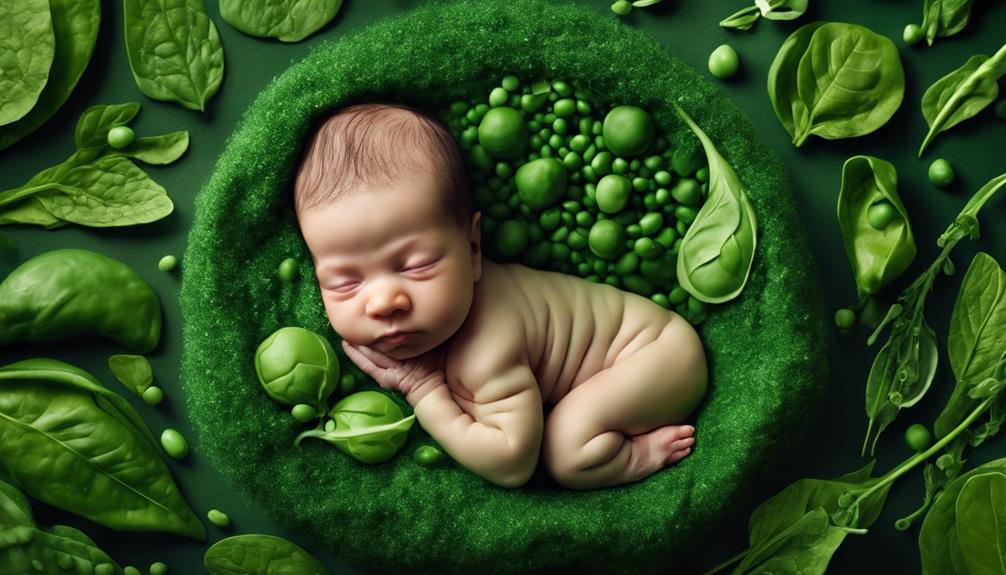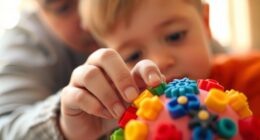When it comes to tackling newborn hiccups, think of yourself as a calming conductor orchestrating a symphony of soothing techniques.
From gentle burping to strategic pacifier play, the possibilities are as vast as they are effective.
But what if the hiccups persist despite your best efforts?
Stay tuned to discover the vital signs that might signal it's time to take a different approach in ensuring your little one's comfort.
Key Takeaways
- Understand newborn hiccups as normal diaphragm contractions.
- Identify common causes like feeding speed and air swallowing.
- Soothe hiccups with back patting, pacifiers, and upright positioning.
- Seek medical advice if hiccups disrupt feeding or persist abnormally.
Understanding Newborn Hiccups
If your newborn is experiencing hiccups, it's crucial to understand that these are caused by involuntary contractions of the diaphragm muscle. Hiccups in babies, especially after feeding, are a common occurrence. Even preemies spend about 15 minutes each day hiccupping, which actually helps in regulating their breathing. Factors like excess milk, fast feeding speeds, and swallowing air during feeds can all contribute to triggering these hiccups in your little one.
When your baby hiccups, it might seem alarming at first, but rest assured, in most cases, it's vital. The diaphragm muscle, responsible for breathing, can sometimes spasm involuntarily, causing these hiccups. It's important to remember that these hiccups are usually short-lived and will pass on their own. While they may seem bothersome, they rarely bother your baby as much as they might bother you. So, take a deep breath, comfort your little one, and know that these hiccups are just a part of their growing and developing body.
Identifying Common Causes

Common causes of newborn hiccups often stem from factors like feeding speed, excess air swallowing, and immature digestive systems. The delicate nature of babies' digestive systems makes them more prone to hiccups, especially during or after feeding. Below is a table summarizing the common causes of hiccups in newborns:
| Causes | Description |
|---|---|
| Feeding Speed | Rapid feeding can lead to your baby swallowing more air, triggering hiccups. |
| Excess Air Swallowing | Babies may gulp air while feeding, contributing to the onset of hiccups. |
| Immature Digestive Systems | Newborns have developing digestive systems that can cause hiccups. |
| Diaphragm Irritation | Irritation of the diaphragm muscle can result in sudden hiccups in babies. |
| Other Factors | Certain foods in a breastfeeding mother's diet may also cause hiccups in infants. |
Understanding the causes can help you make adjustments to prevent hiccups in your newborn. By addressing these factors, you can effectively manage and minimize the occurrence of hiccups, providing your baby with more comfort and relief.
Effective Soothing Techniques
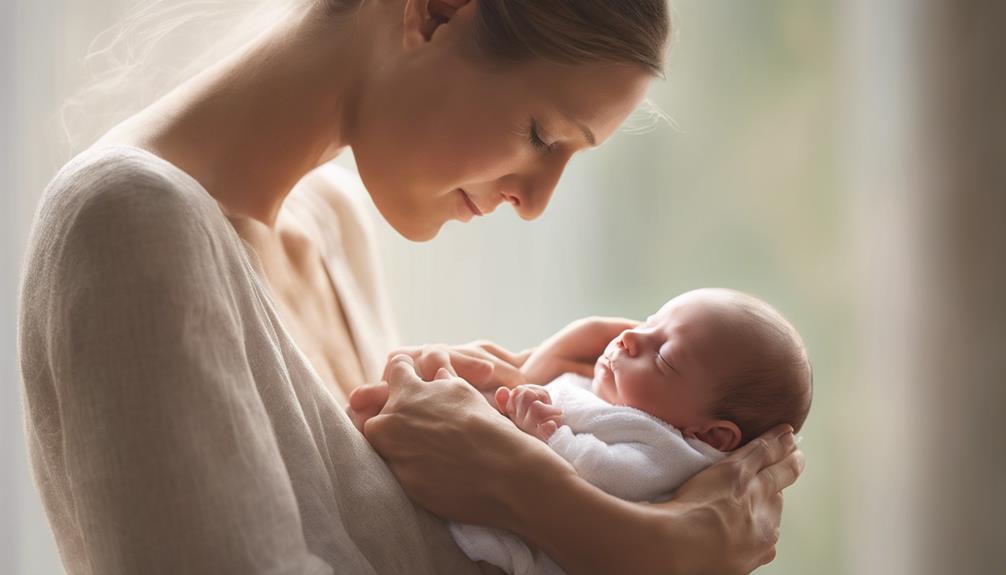
To help ease your newborn's hiccups, consider employing gentle techniques like patting or rubbing their back to release trapped air. Gently patting or rubbing can help alleviate baby hiccups by assisting in releasing any trapped air causing the hiccups.
Offering a pacifier to your little one can also aid in relaxing the diaphragm and effectively stopping hiccups. Keeping your baby upright for around 30 minutes after feeding is another effective method to prevent and reduce hiccups. By keeping your baby in an upright position, you can help minimize the chances of hiccups occurring.
Additionally, burping your baby frequently during feedings can release excess air, decreasing the likelihood of hiccups. Adjusting your baby's feeding position and pace can further aid in preventing hiccups by reducing the intake of air and relieving stomach pressure.
These soothing techniques can make a significant difference in comforting your baby and preventing hiccups from disrupting their peace.
Practical Prevention Tips
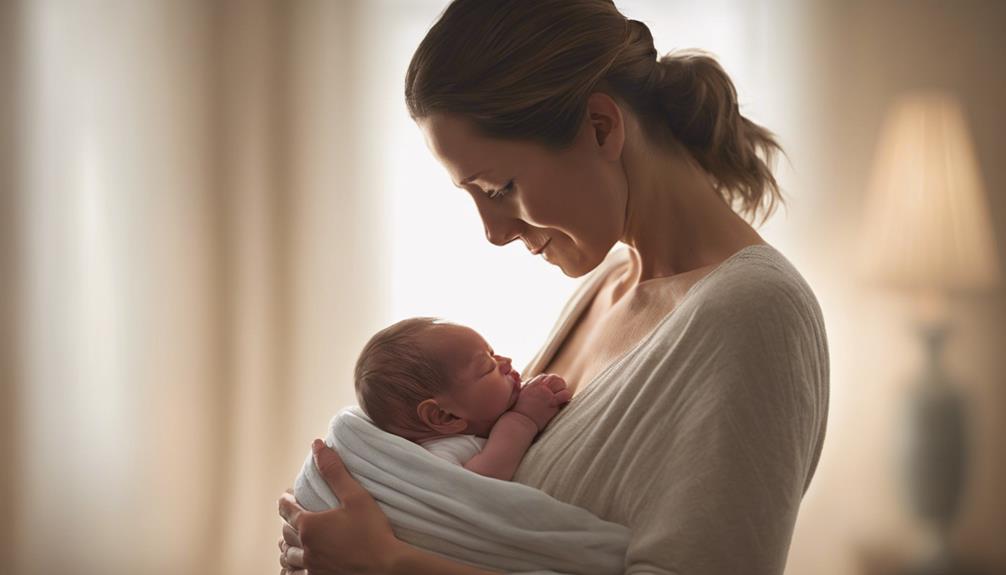
To prevent newborn hiccups, make sure you burp your baby frequently during feedings to release trapped air and minimize the chances of discomfort. Here are some practical prevention tips to help you keep those pesky hiccups at bay:
- Keep Your Baby Upright: After feeding, hold your baby in an upright position for at least 20-30 minutes to aid digestion and reduce the likelihood of hiccups.
- Avoid Overfeeding: Stick to a feeding schedule and avoid overfeeding your baby to prevent excess air intake, which can lead to hiccups.
- Use Correct Nipple Size: If you're bottle-feeding, make sure you're using the correct nipple size to reduce the intake of excess air during feedings.
- Ensure a Good Latch: During breastfeeding, make sure your baby has a good latch to prevent swallowing air along with milk.
- Help Relieve Acid Reflux: Keeping your baby upright after feeding can also help prevent acid reflux, which is a common trigger for hiccups.
Knowing When to Seek Help
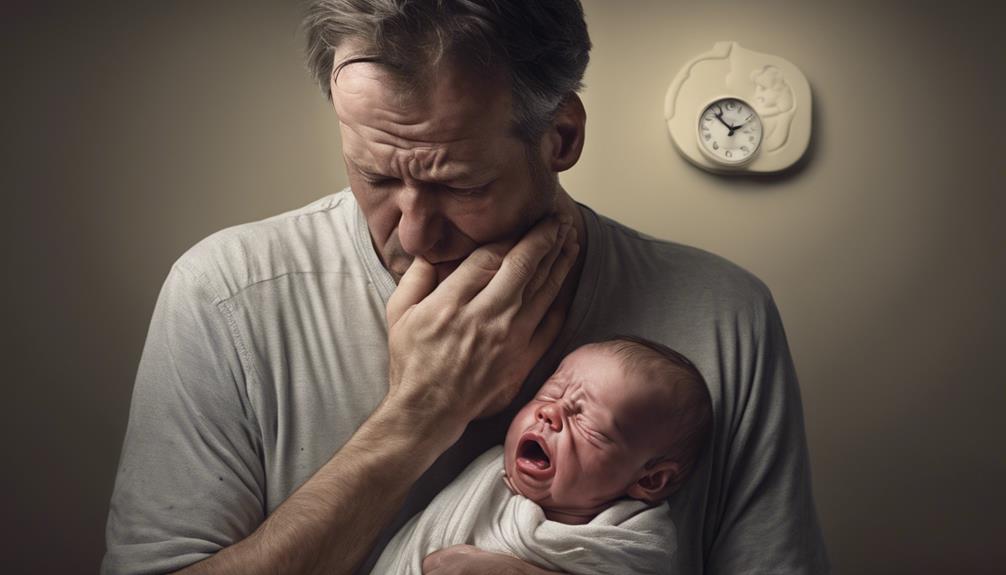
If your newborn's hiccups start to disrupt their feeding or sleep routine, it's important to seek advice from a healthcare provider promptly. While hiccups are common in newborns and usually harmless, if they're causing prolonged discomfort or are consistently present, it may be time to consult a doctor. Trust your instincts – if you feel uneasy about your baby's well-being due to persistent hiccups, don't hesitate to reach out for medical guidance.
Additionally, if your baby's hiccups are accompanied by other concerning symptoms such as vomiting, spitting up excessively, or difficulty breathing, contacting a healthcare provider is vital. Prolonged hiccups lasting over an hour could indicate an underlying issue that needs medical attention.
Frequently Asked Questions
How Do I Relieve My Newborns Hiccups?
To relieve your newborn's hiccups, try burping frequently during feedings, offering a pacifier, changing positions to upright, and gently rubbing the back. Avoid adult remedies like breath-holding or bags. These simple steps can help ease hiccups effectively.
Is It OK to Leave Baby Lying Down With Hiccups?
It's perfectly fine to let your baby lie down with hiccups. Just keep an eye on them and let the hiccups pass naturally. No need to worry, as hiccups are common and usually resolve on their own.
What Is the Best Position for Baby Hiccups?
When dealing with baby hiccups, the best position is holding your little one upright against your chest. This helps ease pressure on the diaphragm. Sitting them up on your lap or placing them on your shoulder can also be effective.
How to Get Rid of Hiccups Fast?
To get rid of hiccups fast, try burping, offering a pacifier, gently rubbing the back or tummy, adjusting feeding positions, and ensuring a proper latch. These simple steps can help soothe your newborn quickly.
Conclusion
To sum up, managing newborn hiccups can be a challenging task for parents, but with the right techniques and preventive measures, it can be easily handled.
Remember, every baby is different, and what works for one may not work for another. So, don't get discouraged if the first method you try doesn't work.
Keep experimenting until you find what works best for your little one. Your patience and persistence will pay off in the end.




